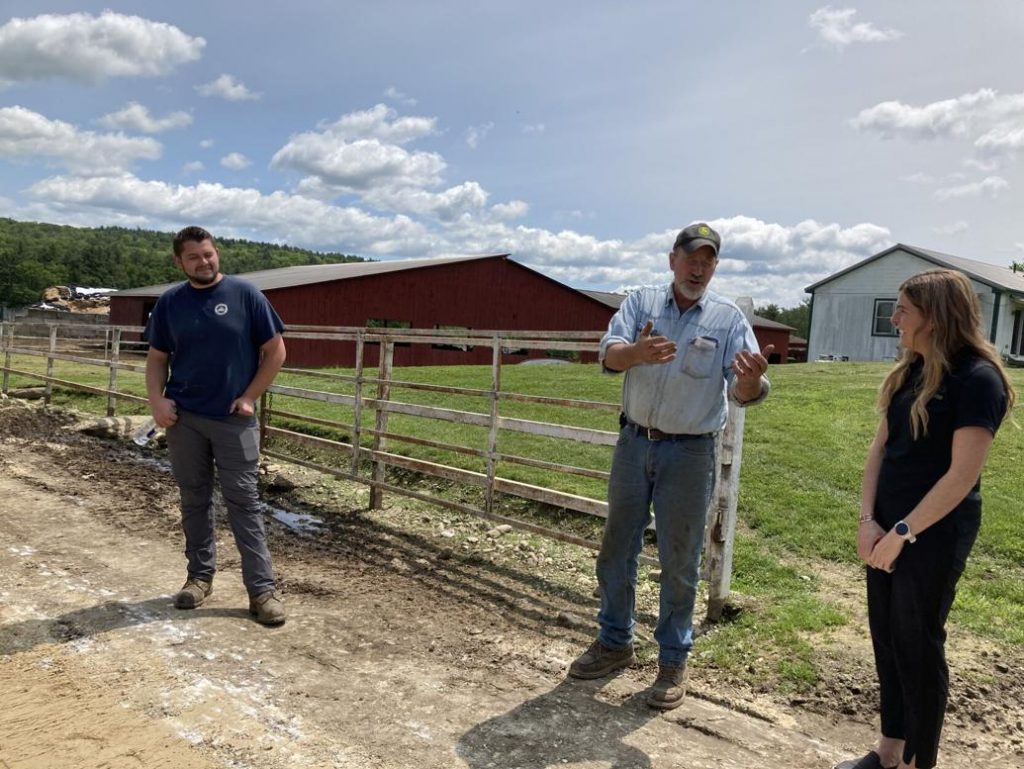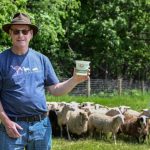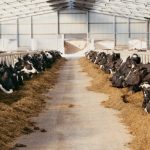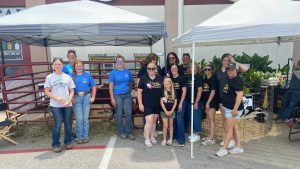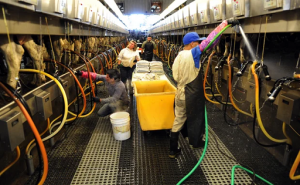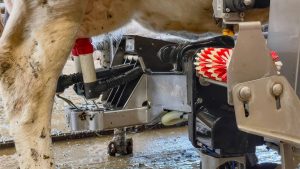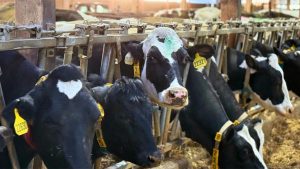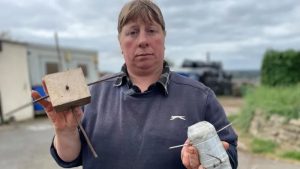
Dairy farming isn’t getting easier.
As the price of milk fluctuates, two farms on Hewins Street are taking very different approaches to their dairy businesses.
At Pine Island Farm, the largest dairy in the state, the Aragi family is banking not just on milk, but also on manure, using a methane digester to transform waste into energy and bedding for cows.
At Maple Shade Farm, Morven Allen and his son and business partner, Ian Allen, are putting more of their trust in milk, scaling up their dairy herd, growing the operation from about 500 milking cows to about 600 in about a year and eventually 700, nearly rivaling the size of Pine Island Farm. The Allens produce grain as well.
Both farms are working to produce more of their own grain, so they can be less reliant on external supply chains for feed.
And both have received significant support for both land and equipment through several state programs, grants and loans.
On Monday, Ashley Randle, commissioner of the Massachusetts Department of Agricultural Resources, visited the Sheffield dairy farms, as well as one in the Hampshire County town of Hatfield, to get a grasp of how these farmers are faring.
Massachusetts is home to 95 dairy farms that contribute more than $61 million to the local economy. The number of farms is down slightly from last year.
‘NOTHING I’D RATHER DO’
Both farmers expressed gratitude for the aid they’ve received.
The Allens have already run out of room for the amount of milk they produce, and each day rely on Dairy Farmers of America milk trucks to carry off some of the supply from their herd of mostly Holsteins and some Jerseys.

Cows at Maple Shade Farm are separated into groups depending on their stage of life.
JANE KAUFMAN — THE BERKSHIRE EAGLE
“We hope that some day we can modernize,” Morven Allen said. “You’ve seen the [milking] parlor. It’s really basic. I’d love to improve it. There’s nothing fancy here. The only good part of that is when it breaks at 4 in the morning, we can usually figure it out.”
The Allens are milking 18 hours a day, with plans to ramp up to 23.
Morven Allen said the biggest challenge right now is labor and overall financial viability.
“The price of all our inputs continues to rise,” he said. “We’re price takers. We’re not price setters. We take what we’re given for our milk. We have no control over that. I still love it every day. Nothing I’d rather do. No regrets. I feel very fortunate.”
Morven Allen, 63, began farming with two cows in Great Barrington at what is now North Plain Farm, then he moved to Alford. There, he ran out of room for milk and looked at a bulk tank at Robbie Chapin’s farm, and ended up buying his farm.
That was in 2003, and he has added to his land holdings since then. The Allens own 600 acres and farm about 2,200.
Joking that he knew since his son was 2 that he would eventually take over, Morven Allen said Ian Allen has always loved farming. But the transition wasn’t quite that simple.

Ian Allen discusses his plans to expand the herd and operations at Maple Shade Farm in Sheffield.
JANE KAUFMAN — THE BERKSHIRE EAGLE
Ian Allen said he studied agricultural business and economics at the State University of New York at Cobleskill, and that he wasn’t certain he’d be able to return home to carry on his father’s farm.
“That was part of his decision to come home after college,” Morven Allen said. “Obviously, he only wanted to do that if he could be a partner. So today he’s a 50-50 partner.”
He said farming with his son has been fantastic.
“I’m one of the luckiest guys around,” he said. “What kills most farms is there’s no next generation. And just look around, there’s so few young people. … In general, there’s no young people in agriculture. It’s sad.”
Randle said she knows there are students graduating from college in Massachusetts who are interested in farming and that land prices are the biggest barrier.
Ian Allen is just about to get married to Carly Shafiroff. He’s hoping to have children who might want to carry on his family’s legacy in farming.
On the tour, he told state officials he hopes to retrofit a barn to add 103 stalls to expand the herd.
Harnessing energy
While there are cows grazing on pasture at Pine Island, all the cows are kept in barns in order to capture every bit of manure they produce.
The Aragi family is now turning waste into energy, selling electricity through a net-metering program through the use of their anaerobic digester and an on-farm generator.
Theirs is one of about 10 farms in the state with this kind of operation.
“Many farms are seeing this as a great way to upcycle and recycle materials on the farm, help reduce waste and at the same time bringing in food waste to help with that effort as well,” Randle said. “So it really is full circle for the environment as well as on-farm management.”

Ashley Randle tours the generator at Pine Island Farm in Sheffield.
JANE KAUFMAN — THE BERKSHIRE EAGLE
Holly Aragi walked Randle and others through the operation, showing the different steps used in order to transform manure into energy — as well as by-products that are useful to the farm and other farmers, such as bedding.
The transition from strictly dairy farm to energy producer has had its own set of ongoing challenges, Louis Aragi Jr. said.
His father began farming in Sheffield in 1964. Today, the family works more than 1,600 acres and has more than 1,600 animals.
“There was a lot of hoops to jump through,” he said. “And no one really knew what the rules were going to be until we were making them as we were going along.”
Today, the operation is regulated by the state Department of Environmental Protection as well as the U.S. Environmental Protection Agency.
“We do have more rules we’ll have to have to follow,” he said. “For the most part, I don’t really have any complaints.”

Holly Aragi explains the process of collecting manure, and milk, from the Holsteins at Pine Island Farm in Sheffield.
JANE KAUFMAN — THE BERKSHIRE EAGLE
With 20 million pounds of milk going out the door, Aragi is considering buying a robotic milking system to reduce labor costs.
“We’re always milking cows here,” he said. “If you come here at 1 in the morning, 4 in the morning, whatever day of the week. That’s where all our labor is.”
He said cull beef prices have risen recently, so that the price he gets for cows and day-old calves is higher than it used to be.
Looking back, making payroll used to be difficult, Aragi said, during the time he expanded the herd, but not today.
“I think we’re relatively safe with that,” he said.
What’s the biggest challenge of the moment?
While he acknowledged that the cold wet spring will be good for hay — and hay prices, “It seems like this past month it’s been weather. Too much rain. [We] can’t get crops in on time.”
You can now read the most important #news on #eDairyNews #Whatsapp channels!!!
🇺🇸 eDairy News INGLÊS: https://whatsapp.com/channel/0029VaKsjzGDTkJyIN6hcP1K
